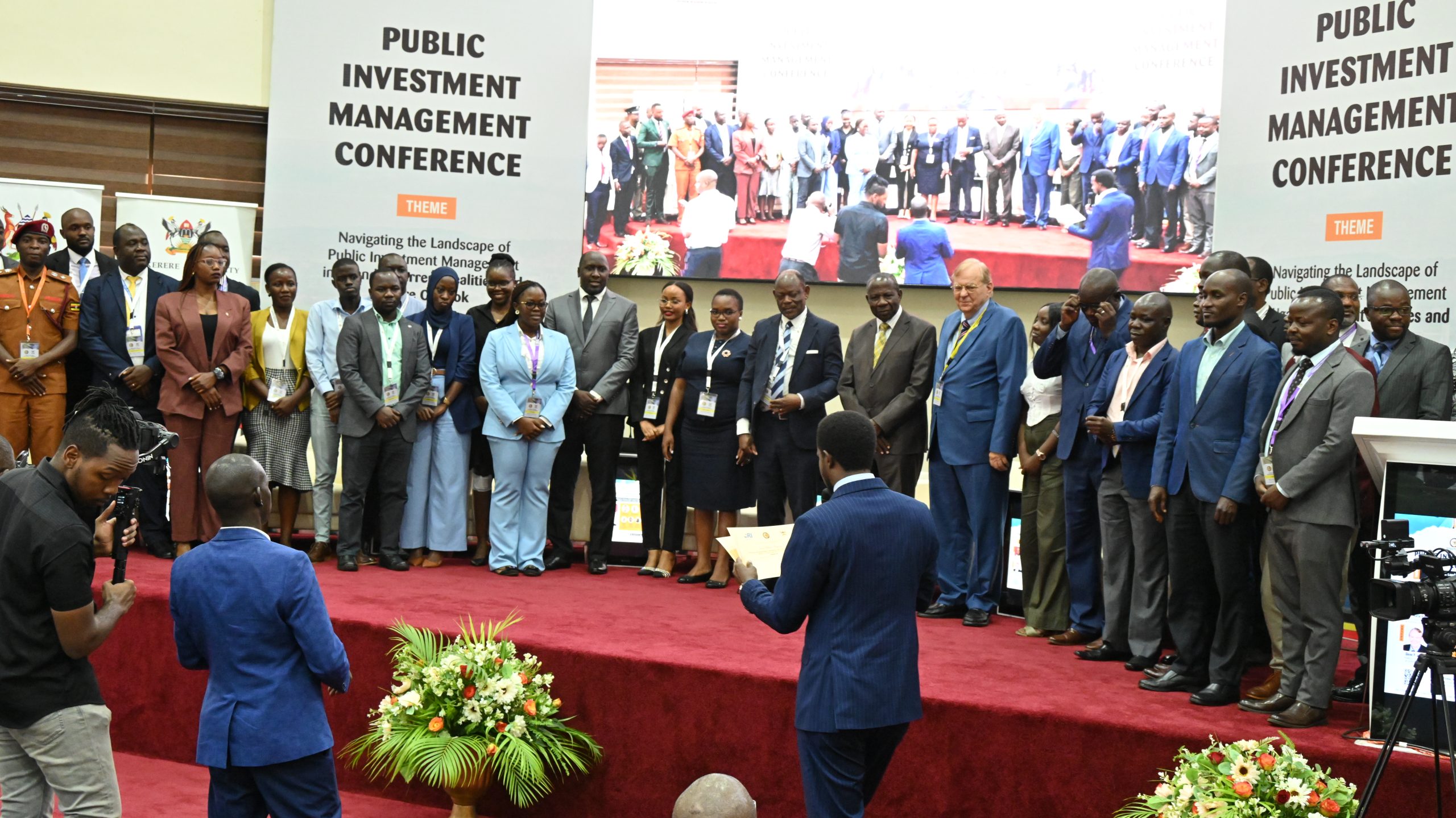The Minister of Finance, Planning and Economic Development, Hon. Matia Kasaija, has outlined Uganda’s economic growth prospects through strategic public investments aimed at achieving sustainable development and transforming lives, particularly for the youth. He highlighted this vision during the inaugural Public Investment Management (PIM) Conference, held on Thursday, October 17, 2024, at Makerere University.

“Public investment is clearly the backbone of our nation’s development, particularly in building the infrastructure, human capital, and institutions necessary to elevate Uganda to middle-income status and beyond,” Kasaija remarked. He called for increased investments to propel Uganda’s economy from its current $50 billion in the 2022/2023 financial year to $500 billion over the next 15 years.
The conference, organized under the theme “Navigating the Landscape of Public Investment Management in Uganda: Current Realities and Future Outlook,” underscored the need for partnerships in the investment sector. The Minister emphasized how infrastructural development can catalyze economic growth and create new job opportunities.
“Investments in infrastructure such as roads, energy, and digital connectivity can stimulate economic growth and attract private sector investment, leading to job creation,” Kasaija emphasized.
He also highlighted the importance of integrating public investment management with government welfare programs such as the Parish Development Model (PDM), Emyooga, and small business recovery funds, which offer critical financing for entrepreneurship. The government is committed to enhancing the efficiency of public spending, focusing on a fiscal consolidation strategy to restore fiscal discipline and reduce public debt.
“Fiscal consolidation does not mean cutting back on investment, but rather optimizing spending by prioritizing high-impact projects that directly contribute to economic growth. Our public investment must align with this strategic direction,” Kasaija added.
To maximize the value of government investments, Kasaija called for a public management system capable of delivering inclusive and sustainable socio-economic transformation, with resilience to issues such as climate change and sustainable development goals.

The Permanent Secretary and Secretary to the Treasury, Mr. Ramathan Ggoobi, also addressed the conference, focusing on the government’s efforts to improve the quality of projects at their inception. He noted the establishment of a dedicated department of project analysis and public investment within the Ministry of Finance, which oversees the ongoing PIM reform process.
Mr. Ggoobi mentioned that the ministry has developed and disseminated guidelines and standardized manuals for project preparation and appraisal. “Our objective is to build the center’s capacity for research that will inform policy changes in PIM,” he said.
He highlighted the positive impact of these reforms, noting that the quality of projects submitted by ministries and agencies has significantly improved. However, Ggoobi stressed the need for more stringent monitoring, especially regarding the low execution rates of externally funded projects, which continue to face delays.
“Cost and time overruns are common, and projects are often poorly executed, which shortens their lifespan. To address this, we are developing a framework for tracking project implementation, fostering a culture of accountability, transparency, and continuous improvement,” Ggoobi revealed.
During the panel discussion, Dr. Joseph Muvawala, Executive Director of the National Planning Authority, advised that the government should focus on constructing the Standard Gauge Railway to ensure that every Ugandan benefits from the infrastructure development. He emphasized that this would be a transformative project for the entire country.
Ms. Barbara Magezi Ndamira, a Senior Public Sector Specialist from the World Bank, pointed out that one of the biggest challenges in Uganda’s PIM is accountability. “The biggest issue for me in the value chain of PIM is accountability. Who is holding the whip to ensure that a five-year project is completed within the set timeframe?” she asked, raising concerns about the lack of stringent oversight mechanisms.
Adding to Ms. Magezi’s concerns, Dr. Asuman Lukwago, Permanent Secretary of the Education Service Commission, suggested that every project should be implemented with a service standard in place, prescribing the timeframes for minor and major audits to ensure sustainability. This, he noted, would help track the progress and quality of project execution.
Dr. Callist Tindimugaya, the Acting Director of Water Resources Management at the Ministry of Water and Environment, emphasized the importance of writing holistic projects that include not only their core functions but also ways in which the public can benefit economically. “We want to explore how a water project can improve household incomes,” he said, highlighting the Ministry’s focus on integrating economic benefits into public projects.
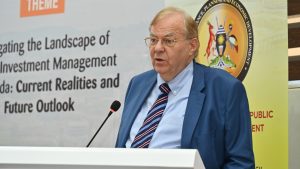
The keynote speaker, Professor Glenn P. Jenkins from Queens University in Canada, shared insights on the current state and future of Uganda’s Public Investment Management System, established in 2016. Jenkins emphasized Uganda’s leadership in Africa in creating a modern PIM system, which integrates financial, economic, and social criteria into public sector decision-making.
“A modern PIM system is more than just investment appraisal—it’s a comprehensive decision-making framework for the public sector,” Prof. Jenkins explained. He also discussed the system’s IT capabilities, which track and capture all project-related data as it progresses.
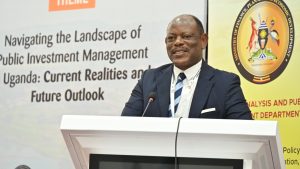
Makerere University’s Vice Chancellor, Prof. Barnabas Nawangwe, called on all stakeholders to collaborate and develop strategies to address gaps in public sector investments. He urged government officials, academics, development partners, and practitioners to use the conference platform to align strategies, share experiences, and explore new approaches to improve Uganda’s public investment outcomes.
“This platform is an opportunity for us all to come together and develop prudent solutions that will elevate our economy,” Prof. Nawangwe stated.
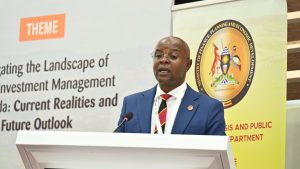
Prof. Edward Bbaale, Principal of the College of Business and Management Sciences (CoBAMS) at Makerere, praised the alignment of the conference theme with the mission of Makerere University’s Public Investment Management Centre of Excellence (PIM CoE). The Centre has been at the forefront of providing transformative training and research for key stakeholders in Uganda’s public sector.
“Since its inception, the Centre has focused on building the capacity of Uganda’s public sector to manage public investments effectively and ensure value for money,” Prof. Bbaale said. He noted that over 200 public service officials have been trained in essential areas such as public investment management, financial and risk analysis, project implementation, and monitoring and evaluation (M&E), equipping them with the practical skills needed to enhance project appraisal and evaluation.
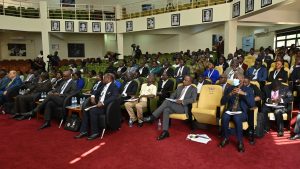
In conclusion, the Public Investment Management Conference provided a critical platform for government officials, academics, and development partners to explore strategies for improving the efficiency and impact of Uganda’s public investments. As highlighted by the Minister of Finance and other key speakers, the focus on accountability, fiscal discipline, and inclusive socio-economic transformation is essential for driving the country towards middle-income status. With ongoing reforms and strengthened partnerships, Uganda’s public investment management system holds great potential to elevate the nation’s development trajectory.

